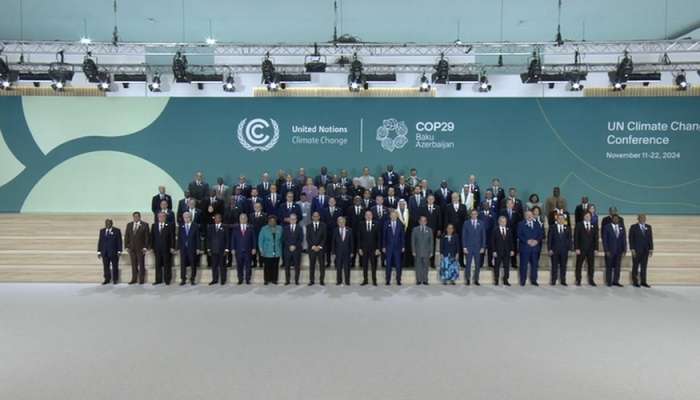
Baku: The Sultanate of Oman participated in the World Leaders Climate Action Summit held in the Azerbaijani capital, Baku on Tuesday.
The Sultanate of Oman’s delegation was headed by Eng. Salim bin Nasser Al Aufi, Minister of Energy and Minerals.
The summit, which was attended by heads of state and government, discussed expanding the scope of cutting greenhouse gas emissions and focused on the issue of financing the Climate Change Loss and Damage Response Fund.
Eng. Mansoor bin Hamad Al Shuaili, a member of the Omani negotiating team at the UN Climate Change Conference (UNFCCC COP29), said that the most prominent files that the Omani negotiators are addressing are the file of adapting to climate change, reducing emissions, the file of technology and knowledge transfer, in addition to the fair transition to energy. He added that the financing file takes center stage as the most prominent file being discussed by the negotiators in an effort to make a rapid progress in this regard.
He explained that through the negotiations, the efforts of countries to reduce greenhouse gas emissions are highlighted. The Omani negotiators seek to highlight the efforts of the Sultanate of Oman in this field.
On the other hand, Dr. Maryam bint Mohammed Al Busaidi, Head of the National Programme for Zero Neutrality said, “The World Leaders Climate Action Summit in Baku discusses the issue of climate finance funds, amid high ambitions regarding this issue, which will support countries in this regard”.
She stressed that the Omani negotiators have been working since the beginning to collaborate efforts in all sectors in the Sultanate of Oman, with regard to the climate change file. She explained that work is ongoing to review the compatibility and integration with the rest of the groups participating in the COP29, including the Arab Summit Group, the Group of 77 and China, and other groups with common interest with the Sultanate of Oman.
Climate negotiators have made progress since the first day of the COP29, and agreed on the rules of a global carbon market managed by the United Nations, while Omani negotiators work with global trends, in light of the clarity of the national scene to achieve zero carbon neutrality by 2050.